Python continues to reign supreme as the world’s most popular programming language, according to the TIOBE Index. This versatile and user-friendly language, named after beloved British comedy troupe Monty Python, has become an essential tool for developers, data scientists and tech enthusiasts alike.
Python’s simplicity and readability make the programming language an ideal choice for beginners, while its robust libraries and frameworks support advanced applications in web development, machine learning and data analysis. TechRepublic takes a look at the top 10 Python courses available in 2024 for developers with different experiences and goals.
When assessing online courses, we examined the reliability and popularity of the provider, the depth and variety of topics offered, the practicality of the information, the cost and the duration. The courses and certification programs vary considerably, so be sure to choose the option that is right for your goals and learning style.
SEE: Udemy Report: Which IT Skills Are Most in Demand in Q1 2024?
Best Python courses: Comparison table
Python Programming MOOC 2024 – University of Helsinki: Best for beginners on a budget
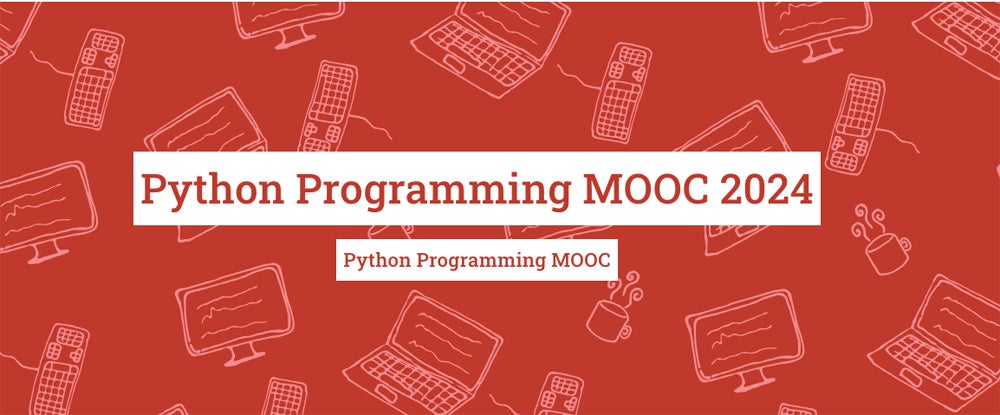
Python Programming MOOC 2024 is a highly-regarded Python course suitable for complete beginners and run by the University of Helsinki. MOOC stands for Massive Online Open Course, so there are no limitations on the number of students who can use the resources throughout the year.
Course content is split into 14 sections of notes, each of which come with about 30 exercises to complete in-browser. This is a self-paced course, though there are exams put on by the University of Helsinki at set dates and times. It is free, but to do the exercises, you need to sign up for a MOOC account.
Price
Free.
Duration
12 hour-long lectures with written notes and exercises. Those who have completed the course say it takes about two months overall.
Pros
- It’s free.
- Beginner friendly.
- There’s an active Discord channel where course participants discuss their progress.
Cons
- Must be self-motivated to complete, as it is self-paced.
- Less intensive and in-depth than other listed courses.
Pre-requisites
None.
Python for Everybody Specialization – University of Michigan – Coursera: Best for aspiring data analysts
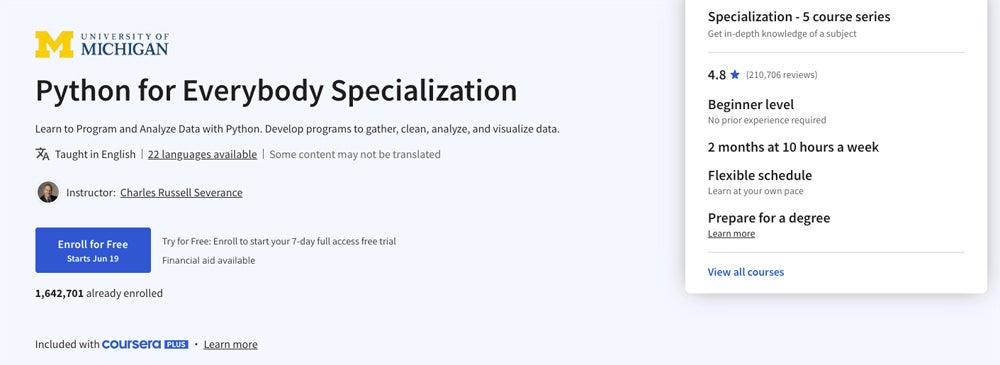
Charles Russell Severance, a Clinical Professor at the University of Michigan School of Information — AKA “Dr Chuck” — is the instructor for Python for Everybody Specialization on Coursera. It covers basic programming principles, but in the Python language, setting up participants to be able to move onto other languages. It covers all the fundamentals as well as data structures, web scraping, databases and more. It ends with a Capstone project where participants can build a program that retrieves, processes and visualises data from the web with a JavaScript library.
Price
$59 a month after a 7-day free trial.
Duration
10 hours a week for two months, but it can take up to eight months.
Pre-requisites
None.
Pros
- Experienced instructor.
- Beginner friendly.
- Teaches practical uses of Python for entry-level data analysis role.
Cons
- Course fees.
- Requires significant time dedication.
- Career certificate itself is not well-respected.
100 Days of Code – The Complete Python Pro Bootcamp – Udemy: Best for beginners who want daily lessons

Dr Angela Yu’s 100 Days of Code: The Complete Python Pro Bootcamp is designed to turn beginners into proficient Python programmers over a manageable timespan. Dr. Yu is a leading bootcamp instructor and has been invited by companies such as Twitter, Facebook and Google to teach their employees. Her course helps its students to actually understand the code rather than just churn out simple exercises by providing a challenge with every new concept. Topics covered include automation, game, app and web development, data science and machine learning. Reviewers praise the pacing, Dr. Yu’s teaching and the diverse projects.
Price
$109.99
Duration
100 days at one hour a day, however, course content is available on-demand.
Pre-requisites
None.
Pros
- Experienced instructor.
- Beginner friendly.
- Encourages you to code every day.
Cons
- Course fee.
- Some outdated content based on reviewers comments.
- There are self-guided projects towards the end of the course that some learners may find tricky without an instructor.
The Complete Python Bootcamp From Zero to Hero in Python – Udemy: Best for beginners who want a crash course

Engineering graduate and professional instructor Jose Portilla leads The Complete Python Bootcamp From Zero to Hero in Python, another top-rated Udemy course. Through a series of 100 lectures, the course starts by guiding learners through installing Python on their operating system before getting into the basics and using the language to manipulate emails, PDFs, Excel files, images and more. Along with lectures, learners have access to tests, exercises and three larger projects.
Price
Full price is $189.99, though Udemy has weekly sales that see this reduced significantly.
Duration
22 hours of on-demand video lectures plus articles and exercises.
Pre-requisites
None. It does contain modules about advanced Python features that are suitable for programmers with basic experience.
Pros
- Experienced instructor.
- Good explanations of the basics.
Cons
- Limited content on more advanced topics and using Python for real-life tasks.
- Course fee.
futurecoder: Best for learning on the go
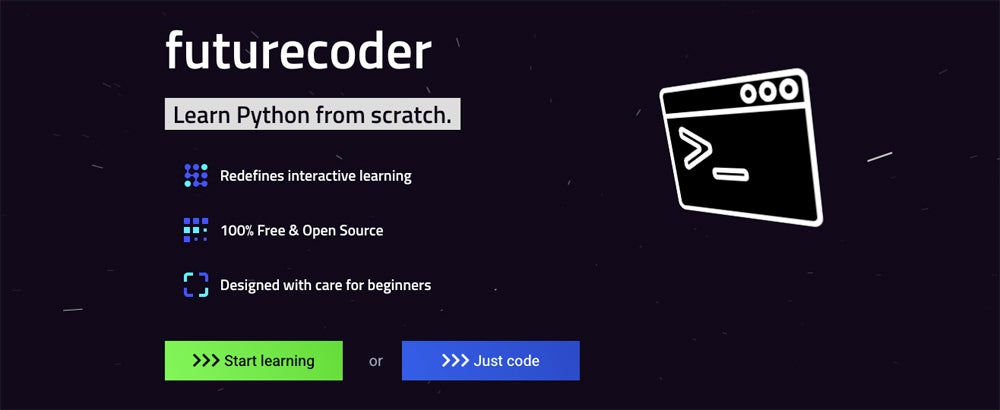
If you’re not into video lectures and want to learn Python at your own pace through step-by-step exercises, then futurecoder may be the course for you. This has the fewest barriers to entry of all the courses, as no account is required to get started (but you can get one if you want to save your progress), and the whole thing takes place in-browser.
Standout features include the very gradual guidance provided with each exercise, rather than large hints or complete solutions. Answers are automatically graded, error messages are easily understandable and it provides debugging tools for extra understanding of what went wrong. futurecoder is 100% free and has no ads, and feels more like Duolingo for coding than a university-style course.
Price
Free.
Duration
60 exercises, each of which take between 10-30 minutes to complete.
Pre-requisites
None.
Pros
- Free with no ads.
- Slick interface.
Cons
- No video tutorials, but this may be a pro depending on your learning style.
- It’s quite short, not taking the learner to a very advanced level.
Automate the Boring Stuff with Python Programming – Udemy: Best for automating real-life tasks
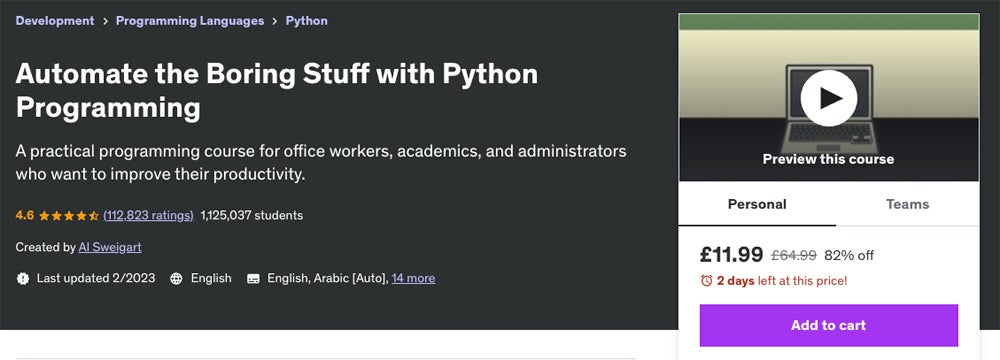
Automate the Boring Stuff, taught by software engineer and tech book author Al Sweigart, is best for learners who want to dive right into real-world applications of Python. It is perfect for office and administrative workers looking to improve their productivity by programmatically updating spreadsheets, parsing documents, sending email alerts and more.
While there are a few quizzes, the majority of the course is screen recordings with Sweigart’s voiceover and some downloadable scripts, so those looking for something more interactive may want to choose a different course.
Price
Full price is $119.99; however, Udemy has weekly sales that see this reduced significantly.
Duration
9.5 hours.
Pre-requisites
None.
Pros
- Focuses on practical uses of Python from the get-go.
- Based on a well-reviewed book of the same name.
- Book of theory can be downloaded for free.
Cons
- There is not a lot about computer science theory, so this is not ideal for those looking to go into a career as a developer.
- Certification is not well-regarded.
- Course fee.
- Some reviewers have found the exercises difficult without prior Python knowledge.
MITx Introduction to Computer Science and Programming Using Python – edX: Best for in-depth computer science
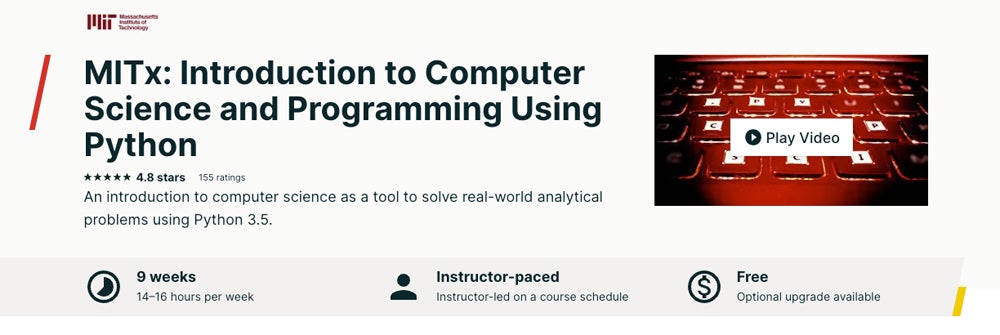
Introduction to Computer Science and Programming Using Python is the first course on this list to require a basic knowledge of mathematics and programming. Run by MITx, the online learning arm of the Massachusetts Institute of Technology, the lecture series intends to teach students how to think computationally to prepare them for a career in software engineering. It includes lecture videos, exercises and problem sets using Python 3.5 and covers lots of different areas, like algorithms, testing and debugging and data structures.
Price
$149 for full access to course materials and certification upon completion. However, limited access to course materials is provided for free, but you cannot take graded assignments or exams.
Duration
9 weeks, 14 – 16 hours a week.
Pre-requisites
High school algebra and a reasonable aptitude for mathematics are required. Students without a prior programming background will find there is a steep learning curve.
Pros
- Expert tutoring from MIT professors.
- Course material is free.
Cons
- Course fee.
- Not many real-world applications are taught that are based on the computer science theory.
- Reviewers say it is easier with the accompanying textbook, which comes at an additional cost.
- Complicated mathematics involved in the latter part of course.
Professional Certificate in Learning Python for Data Science – Harvard University – edX: Best for machine learning and data science for beginners

If you’re looking to initiate a career in data science, then an education from Harvard University is a great place to start. The Professional Certificate in Learning Python for Data Science, offered via edEx, consists of video lectures, programming exercises and quizzes.
Learners have access to the Python portion of the famous CS50: Introduction to Computer Science module, as well as others covering probability, data science and machine learning. While the material becomes in-depth like the other courses on this list, it does begin with teaching how to read and write Python code. It also includes applications of Python specific to data science, utilising libraries like numPy, matplotlip and Pandas.
Price
$747.
Duration
6 months, three to six hours a week.
Pre-requisites
None.
Pros
- Taught by Harvard University experts.
- Specific to data science.
Cons
- Course fee.
- Course duration is long.
Google Advanced Data Analytics Professional Certificate – Coursera: Best for advanced data analysts
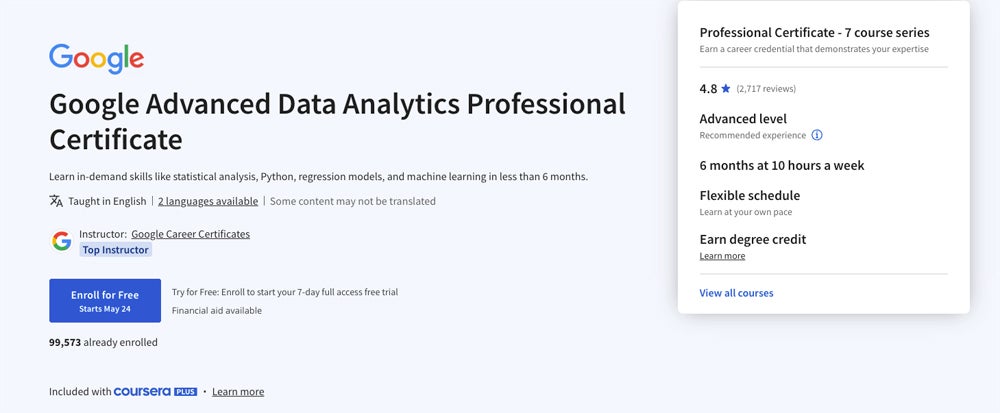
Google’s Advanced Data Analytics Professional Certificate expects some proficiency with data analytics prior to starting the course, though Python fundamentals are covered as appropriate for beginners. The series of five courses takes learners from language and data analysis basics into more advanced regression analysis and machine learning.
Specifically, it covers the manipulation of large data sets, using machine learning to find patterns in data, data visualisation, analytics tools — like Jupyter Notebook, Tableau and more. Projects are distributed throughout the course that can add to the learner’s portfolio of work, and there is a capstone at the end that combines all the lessons.
Price
$59 a month after a 7-day free trial.
Duration
Six months at 10 hours a week.
Pre-requisites
Prior knowledge of foundational analytical principles, skills and tools. Some programming knowledge is also useful.
Pros
- Goes beyond the theoretical to teach how to apply data analytics to real-world scenarios.
- Includes information about the data analyst job market and how to prepare for applications.
Cons
- Course fee.
- Requires experience. Beginners should try the entry-level version.
- Substantial time commitment required.
PCAP- Programming Essentials in Python – Cisco Networking Academy: Best for well-known certification

While certifications are somewhat controversial amongst developers, with some believing that experience is more valuable, pursuing a well-regarded accreditation is often a good way of ensuring you have comprehensive knowledge in an area. The Python Institute offers the most well-known set of Python certifications, which are aimed at four progressive levels: entry-level, associate, professional 1 and professional 2.
This free course from Cisco Networking Academy guides learners through the content of the first two levels and prepares them for the Certified Entry-Level Python Programmer Certification and Certified Associate Python Programmer Certification exams. Content is delivered through practice labs, interactive activities, videos and assessments.
Price
Free, though there are fees associated with the exams that lead to formal certification. Currently, it costs $59 to take the PCEP exam once and $295 for the PCAP.
Duration
75 hours.
Pre-requisites
None.
Pros
- Beginner friendly.
- Course content is free.
Cons
Is it worth paying for a Python course?
The short answer is it depends on your budget and what motivates you.
There is a wealth of free resources available through some of the courses listed here as well as in library books, on YouTube and elsewhere online that will enable a motivated student to get to grips with Python. Many developers insist it is possible to master programming without paying a penny by working on small projects like those on GitHub and learning on the go, which could be a good option for those on a budget. Alternatively, check out the free courses Python Programming MOOC 2024 and futurecoder.
However, the key to learning any new skill is to be persistent, and it can be difficult to remain motivated without a defined learning programme to follow, coursemates to connect with or a course fee at risk of going to waste. For individuals with a tendency to start projects but not finish them, an initial investment in a structured course may provide the motivation they need. Many paid courses also give direct access to qualified instructors who can provide tailored help that would otherwise not be available. Therefore, a paid course like 100 Days of Code may be worth it in the long run, as the fee provides motivation to continue progressing.
Is Python the best programming language to learn?
Python is widely regarded as one of the best programming languages for beginners for a number of reasons.
- It is easy to understand, as its syntax is intuitive and closely resembles natural language.
- It is versatile, used in various relevant domains such as web development, data science, automation, AI and scientific computing.
- It has extensive libraries and frameworks, like NumPy, Pandas and TensorFlow, enabling developers to build larger programs without starting from scratch.
- It integrates well with other commonly-used languages like C++ and Java, technologies like Terraform and REST APIs, and platforms like Amazon Web Services and Raspberry Pi.
- It is used by many major tech companies, including Google, Netflix and Meta.
- It has a large and active community of users who update tutorials, documents and open-source projects to support learning.
SEE: Top Python AI and Machine Learning Libraries
Do employers look at Python certifications?
Every employer is different, and while some may be looking for specific skills that are proven by well-regarded certifications, others may be more interested in project work, collaboration and other experiences. Before embarking on a Python course to obtain a certificate, look at the requirements of vacancies that interest you.
Certifications are somewhat controversial in the developer community for a number of reasons. Many believe that the availability of free resources for learning means that paid certifications are financially exploitative. Programming languages and technologies also evolve quickly, so certifications can become outdated but remain advertised as worthwhile. Some courses focus more on teaching theoretical knowledge rather than how to solve real-world problems, and therefore the certification is not representative of programming ability.
On the other hand, the job market for junior developers is tight, with many career-changers looking for an entry-level role in tech, and AI tools taking on tasks normally given to less experienced employees. Therefore, it is important to differentiate your CV from others, and certifications in specific areas of software development can be a good way of doing so. A certificate can also provide motivation to push through to the end of a lengthy course of study.

